There are sailors who won´t get seasick ever, than there are sailors who will most certainly be out of order for one or two days no matter what. And then there are sailors who cannot predict if they become seasick or not: Nevertheless, this nausea is a more or less severe problem amongst seafarers. In its easiest form sea sickness is just an annoying part of a sailing trip – hit hard, sea sickness can develop into a serious safety problem for the whole crew. Let´s take a look at the cause and the symptoms and how you may treat sea sickness. Therefore I´ve talked to pharmacist Zeynep who was willing to answer all my questions and present a range of products you could take to cure the symptoms of seasickness.
What is Sea-Sickness? Cause and Symptoms.

I´ve finally experienced sea sickness by myself during our 1.000 mile trip from Lisbon via Madeira to Lanzarote early last month. And I haven´t been alone: During the first 2-4 days nearly 50 per cent (!) of the crews in all six yachts had been suffering more or less from sea-sickness. More or less severe: Where I was very glad of not having had to feed the fish, many others had been forced to regularly vomit. That´s one of the symptoms for sure, but this isn´t where it starts. Let´s take a closer look at the cause and the symptoms of sea-sickness.
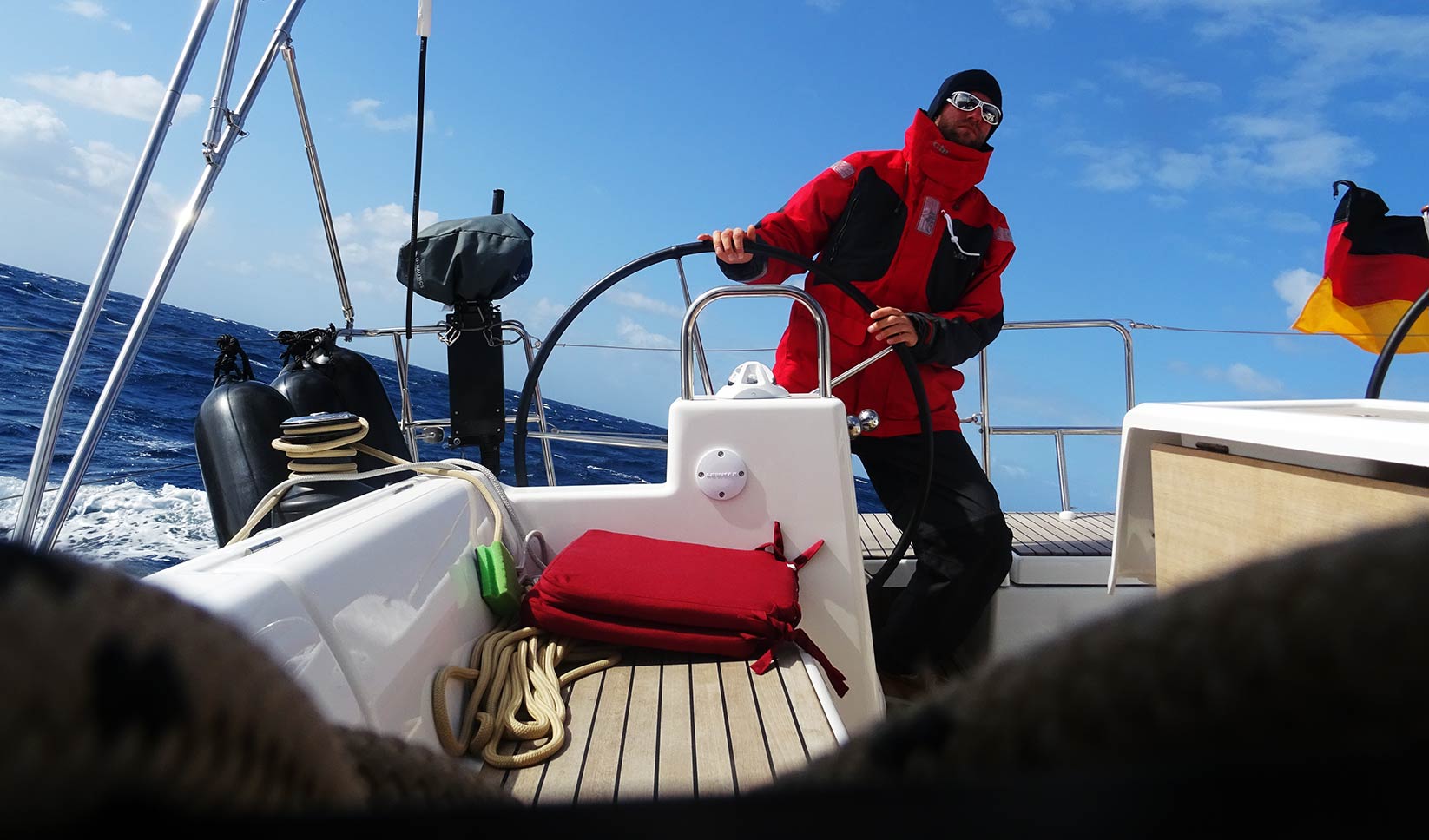
There are many names for it: Motion sickness, nausea, sea sickness, travel sickness. But all is the same: A very annoying (at least) malady which can turn the otherwise nicest sailing trip into a sheer nightmarish experience – for the sick person as well as for the fellow crew members who stay unaffected. What is sea sickness? As Wikipedia states, sea sickness is a “condition in which a disagreement exists between visually perceived movement and the vestibular system’s sense of movement.” In other words: The constant, sometimes violent up and down of the yacht causes a brain-overload. Note that “nausea” derives from the Greek word “naus” – “ship”.
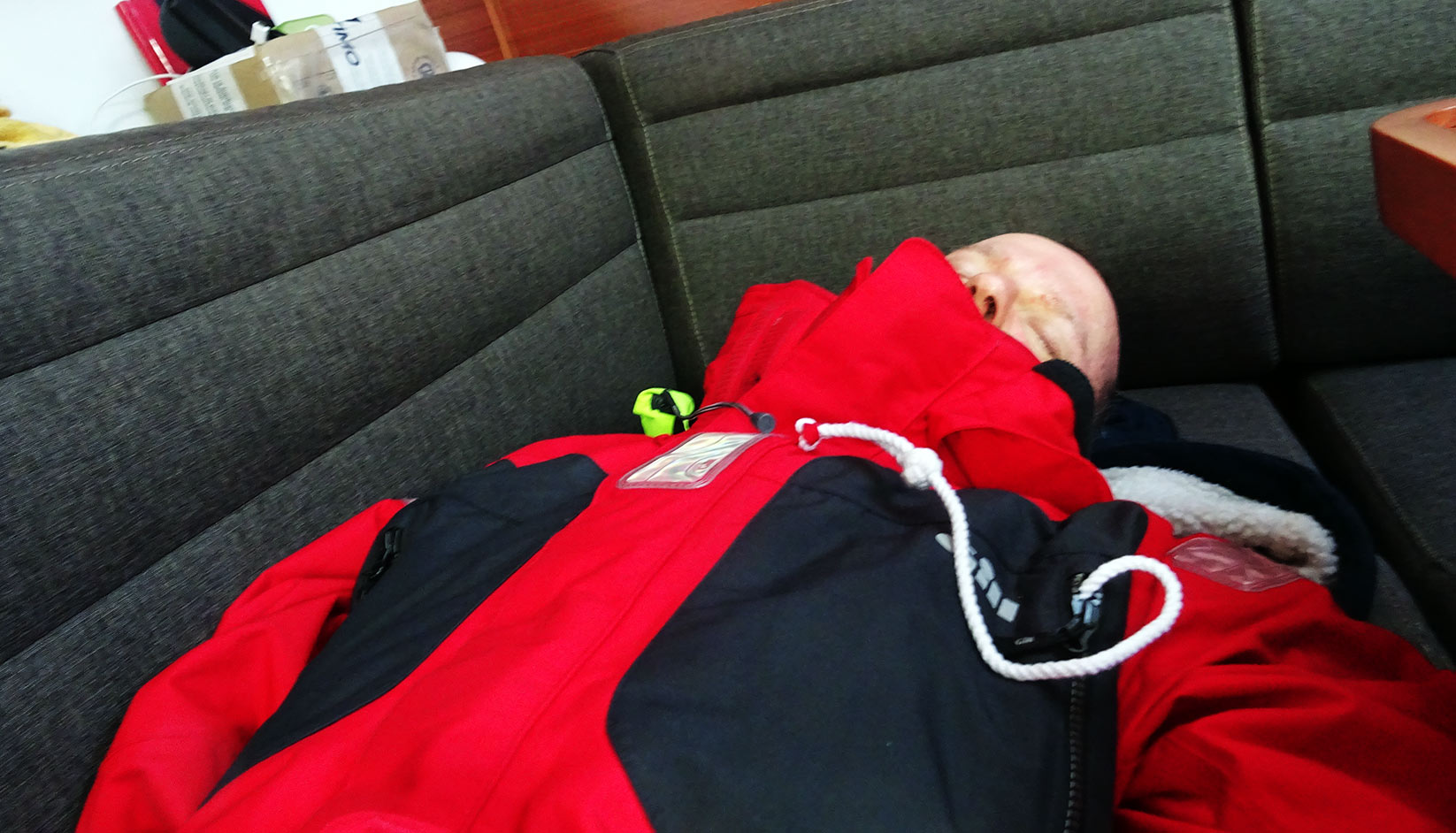
So what´s basically happening is that if the brain detects motion but cannot actually see it (which is common below deck in sailing yacht or when sailing during a pitch black night), it “believes” that something toxic has entered the body: As it cannot connect motion to vision it concludes that the person is hallucinating due to the toxic substance that must have entered the body. The brain will release hormones which will simply cause vomiting – in hope that the toxic will be washed out of the body.
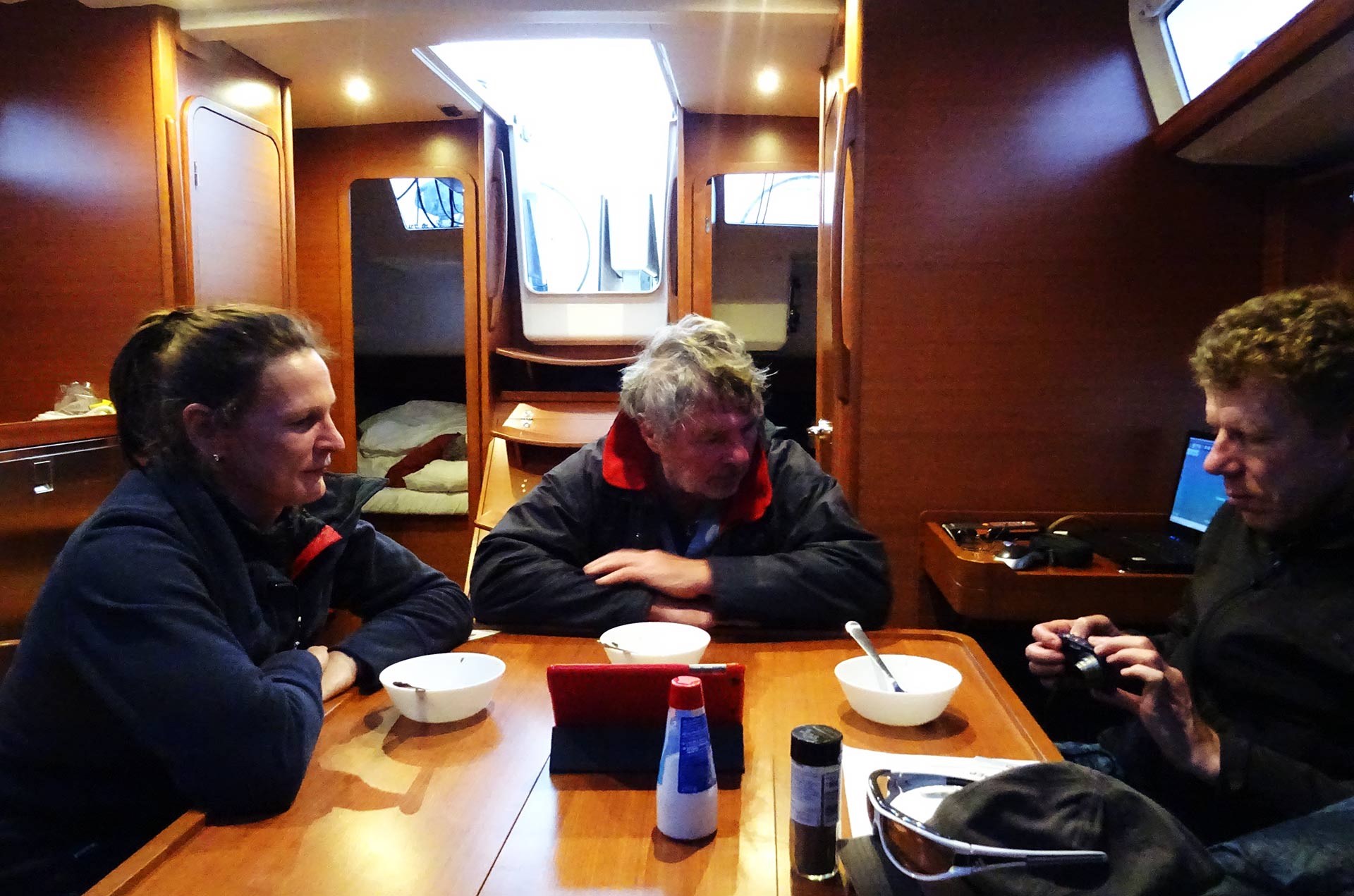
There is another alternative theory which says that the extreme motions of the very muscles which are moving our eye-balls causes the body to react. This is known as the Hystagmus Hypothesis. Simply said, there are six muscles which are responsible for moving our eyes. In the cause of extreme motions of the boat, these muscles will have to “work” also in an extreme – and previously unknown – way. This causes trouble in the brain provoking motion sickness and the will to cause the body to vomit. This theory is much discussed but it´s striking that some patients of sea sickness who take medicine which supresses eye-movement will experience a rapid cure from motion sickness. My own experience was: Get down below as fast as you can and lay down in bed. Refrain from eating, just have sweet tea. That´s it. After two days I´ve got my “sea legs” and the mumbo-jumbo was over.
Is there a Prophylaxis against Sea-Sickness?
From a lot of sources – be it sailors, friends but also pharmacists in drug stores and even my physician – I´ve heard that high doses of Vitamin-C are to be consumed for sea-sickness-prevention. The thing about Vitamin-C is, according to those sources, that it will scale down the production of histamine and therefore reduce to chance of getting seasick. The Vitamin-C therapy should start well in advance of a sailing trip – one week is minimum. A dose of 1.000 mg daily should be taken, as they say. This is what I did in advance of the Atlantic trip and – as you may have read – it hit me. And it hit me hard. As one sceptical pharmacists and also Zeynep told me, Vitamin-C on the other hand cannot hinder sea-sickness, others swear that Vitamin C is THE cure. Note: As the human body only has a daily demand for 90 to 100 milligrams of Vitamin-C, the surplus amount will be discarded by the body anyway.
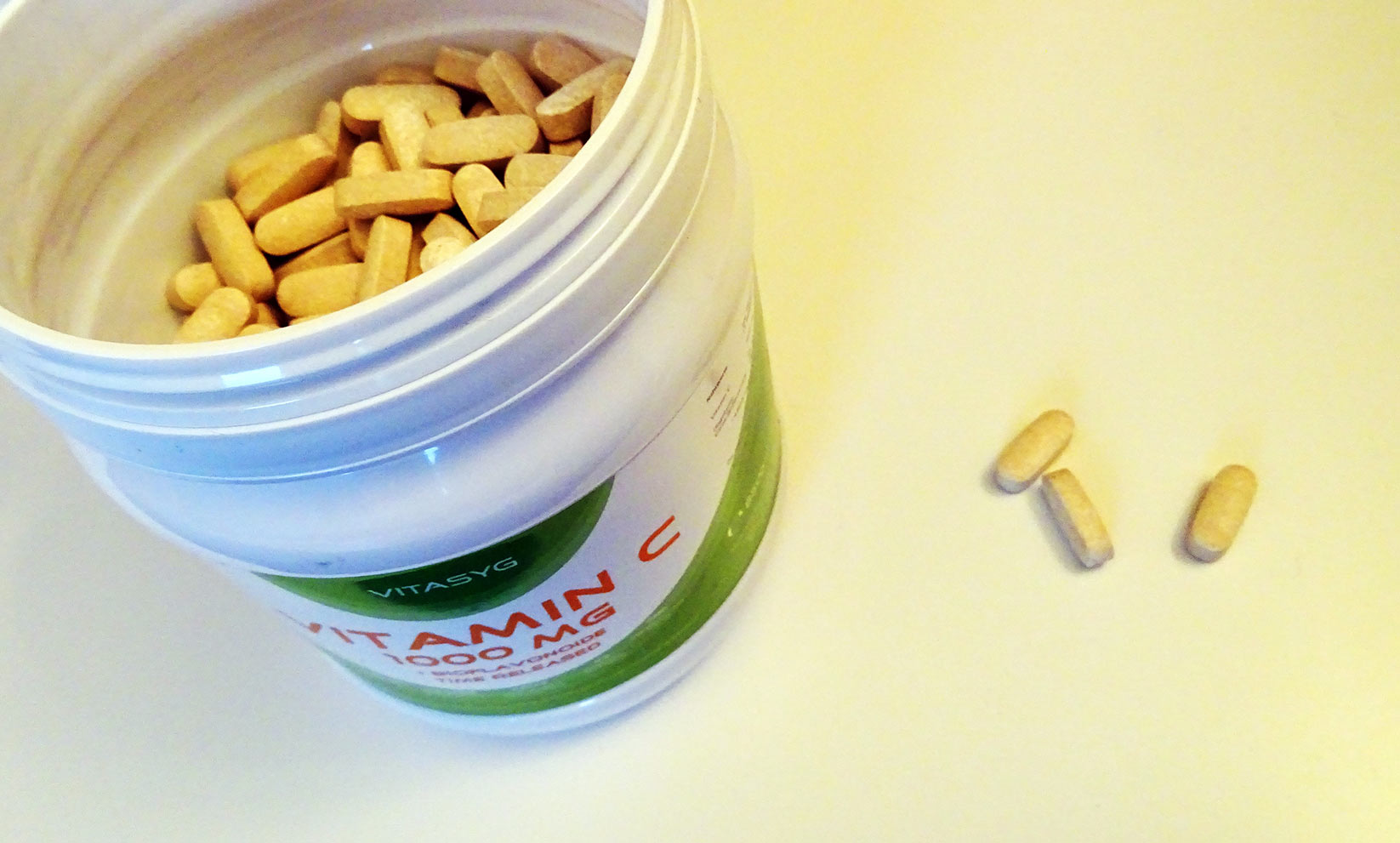
“I wouldn´t believe in the Vitamin-C therapy”, concludes the pharmacist – but: “Vitamin B, to be precise, Vitamin B6 and B12, have a higher chance of being effective. With Vitamin B12 being the most capable of them two.” That´s because these two Vitamins are a part of the hormone-regulation mechanism of the body. B12 can significantly scale down the distribution the very hormones which are responsible for nausea. “Pregnant women take supplements with B12 against nausea and we have good experiences with the outcome.” But Zeynep also warns: “Not every product where B12 is announced has the ´good´ B12 in it the body can verwerten. Don´t go for cheap supermarket-products, read the ingredients-list: You should go for products with B12 in form of Cyanocobalmine or – better – Methylcobalmine.”
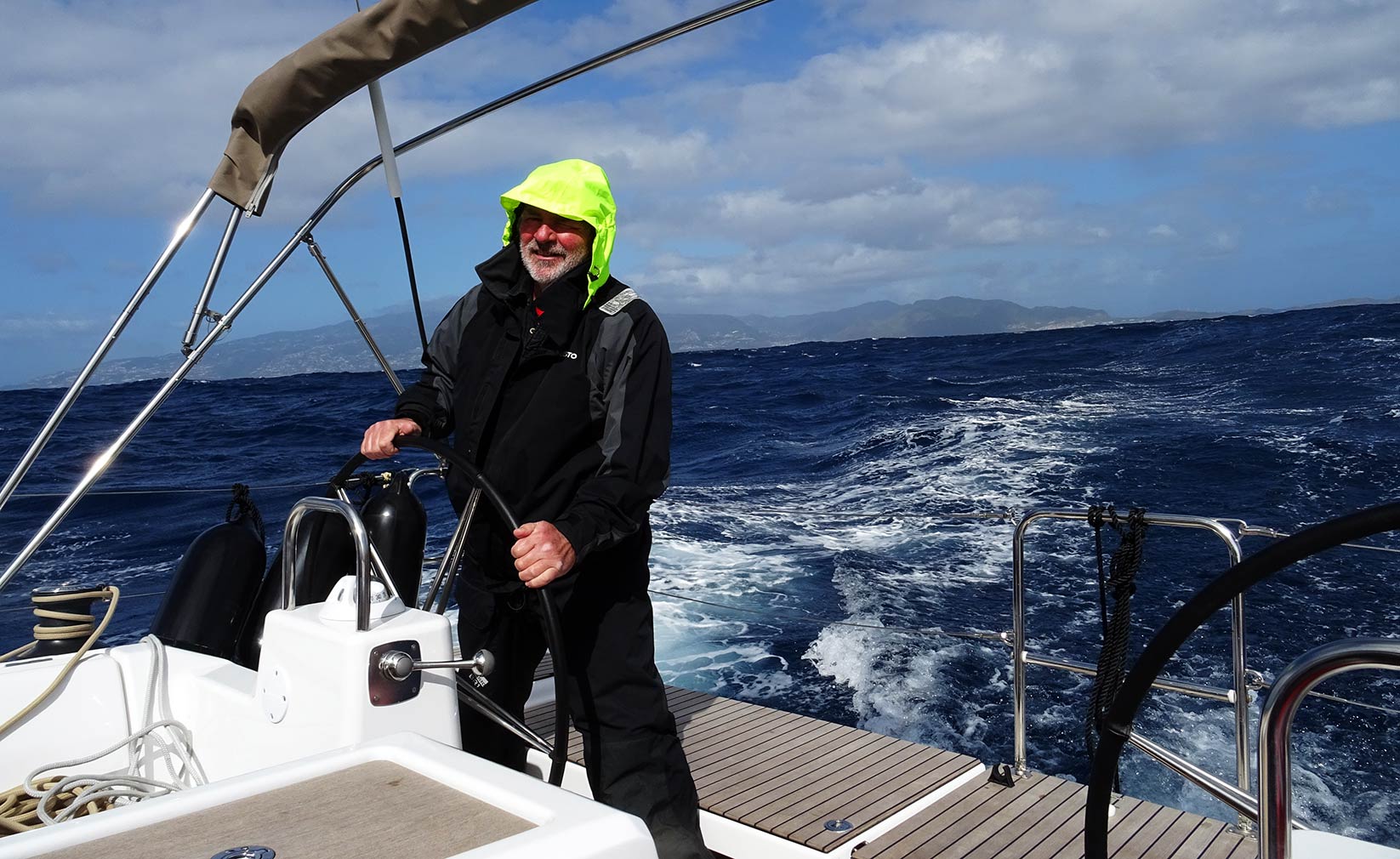
What else could you do to prevent of getting sea sick? Well, essentially – nothing. When it strikes, it will strike. “There are some techniques to reduce the symptoms”, says Zeynep. “Like for example staying outside in the cockpit as long as you can, take deep and conscious breaths – because keeping the system going and sending down loads of oxygen is essential. Also, focussing on the horizon can prevent the equilibrium-sense from going crazy.” Yoga, relaxation-techniques and other exotic methods on the other hand are considered less practical aboard an oceangoing sailing yacht here. But: “Refrain from heavy duty food such as fatty red meat. Also alcohol shouldn´t be on the dining table before and during the trip.”, Zeynep recommends. So, what to do when our precautious methods failed and sea-sickness strikes? Don´t panic: There´s the pharmazeutical industry with a range of products.
Common pharmaceutical solutions to Sea-Sickness.
Going into a pharmacy shop and asking for medicine against motion sickness, there is a range of product. Let´s take a look at the chemical solutions first. “Before talking of the products”, says Zeynep, “we should consider the speed of the effects and the very type of drug first.” There is essentially the pill, the juice, the chewing gum and the suppository. “Each of them has it´s own unique style of effect and the time it takes to really cause an effect.” Zeynep point to the chewing gums, in this case Superpep, one of the big market leaders in Germany. “I like the chewing gum because it has essentially two ways of effecting the body”, she explains: “By chewing the gum the body will absorb the active components very fast through the digestive system and the oral mucusa.” Secondly, as she points out, the very process of chewing is a distraction from nausea, production of saliva will be stimulated and that both will have a positive, curing effect. When I was sea sick, I also took Superpep, but the pill-variant. “Pills and Juice are effective of course”, Zeynep says, “but their speed is slower. It just takes time for the effective ingredients to pass through the stomach into the system.” Taking a pill should therefore be done in advance or with bearing in mind that it could take from half up to a full hour for the medicine to unfold effects. In my case, I couldn´t tell if the Superpep-pill did anything at all to cure me.
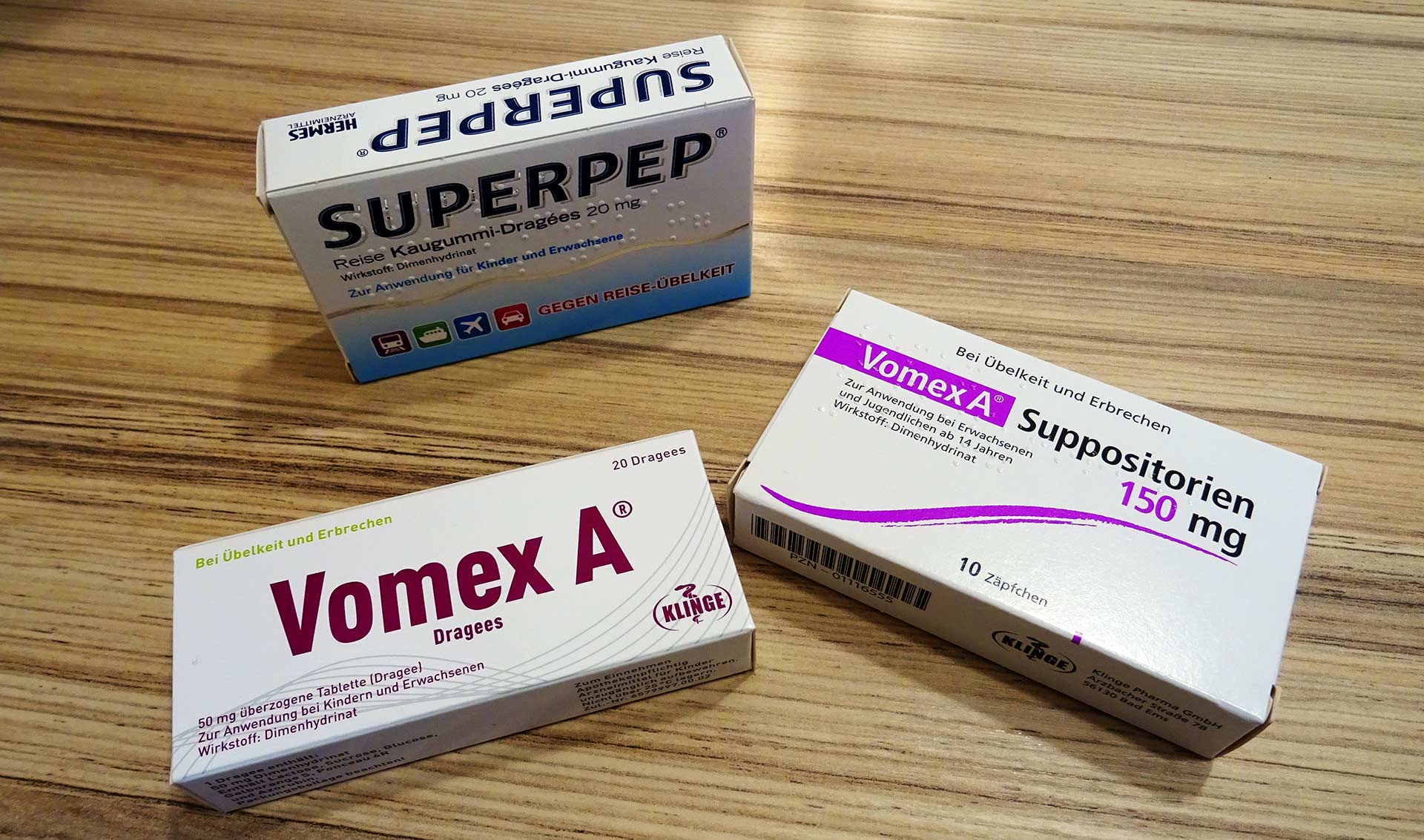
“The most effective of the non-prescription drugs is the suppository”, Zeynep explains: “Just because the speed is immense. Placing the drug to the anus might be of discomfort for people, but it has it´s clear advantages: “It´s fast, very fast. On the other hands, if you are vomiting all the time it might be a problem to swallow anything down your throat – and keeping it down. So in that light a suppository is a then suddenly a very attractive alternative.” But Zeynep also warns: All these drugs have side effects. “People can be very tired. A kind of “don´t give a damn”-attitude which can pose a severe threat to the safety of themselves as well as of the whole boat.” In any case: Inform the Skipper of the boat upon taking any drugs.
Non-chemical Alternatives
I must admit that I don´t like the chemical stuff at all. Not for the side effects but for the pure knowing that I am inducing something alien to my body. Although, when I was sea sick, this attitude quickly vanished and I took anything I could, to be honest. But there are herbal alternatives as well. “One is – also as precautious measure – to eat a lot of Ginger.”, says Zeynep. It contains a lot of Vitamins but the main effect is that Ginger can push the blood circulation and some of its active components are blocking receptor cells in the stomach where otherwise the nausea-causing hormones will dock thus preventing motion sickness quite effectively.

Another thing is the Sea Sickness Band – a best seller in pharmacies worldwide. In fact, Ute, the lady who came with us on the 1.000 miles trip, did wear one of these and although she has been affected by sea sickness as well, her suffering was over faster than mine. It took her just one day to full recovery. The Sea Sickness Band triggers the so-called Nei-Kuan- or P6-Point at the wrist. By gently pushing this point with a small ball that is stitched in the band, it works according to acupressure-theory. And some people swore to me that it really works.
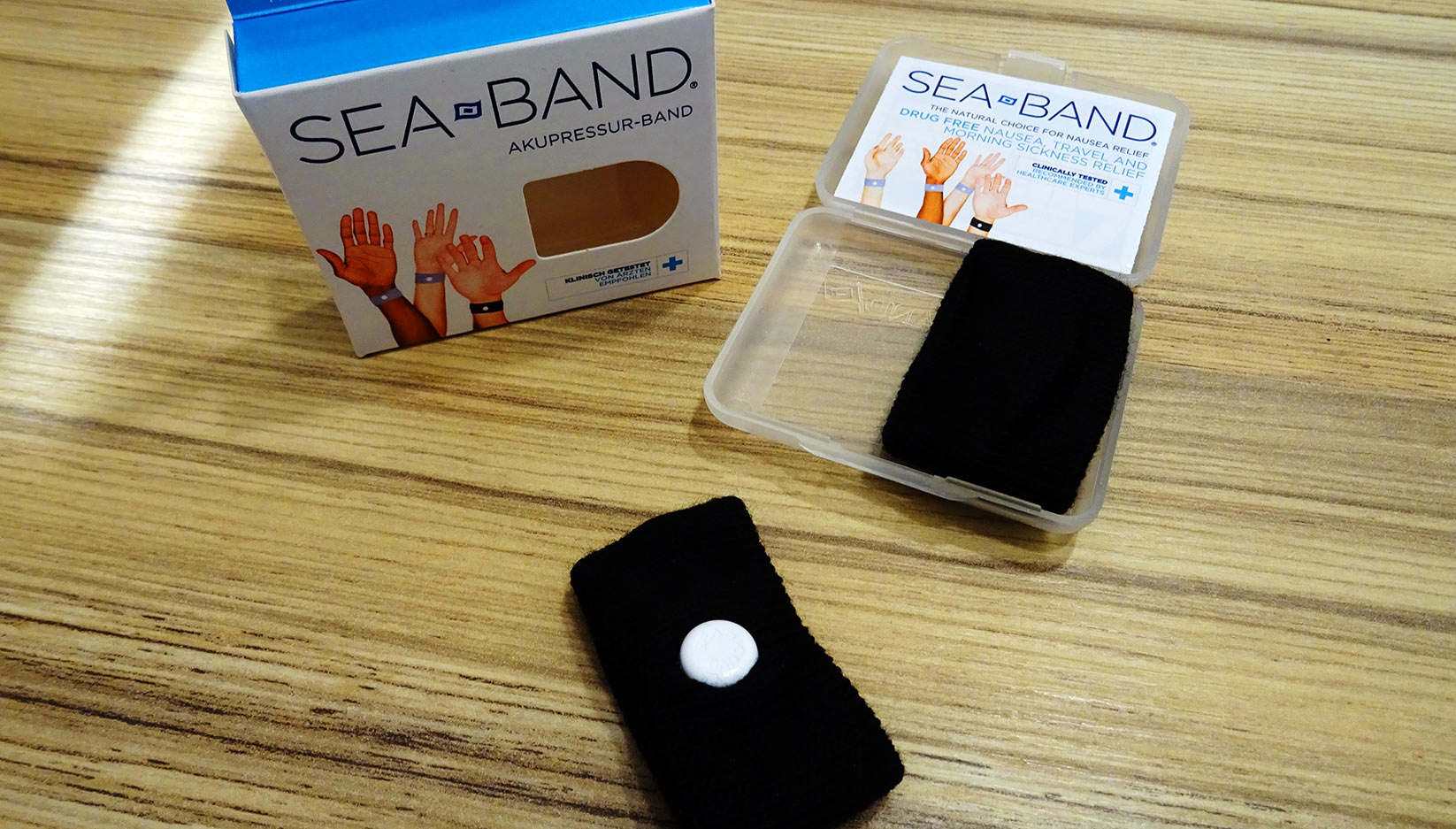
Talking of Ginger, if you don´t like the hot taste of Ginger nor the taste anyway, you can rely on Ginger-products available in the pharmacy and drug stores. These powders will be dissolved in water and you drink it like a tea or a cold beverage. “Herbal and non-chemical alternatives can be as powerful as pharmaceuticals”, says Zeynep and therefore shouldn´t be put aside. But I was blocking her initiative to talk about homeopathy instantly as this is one “science” I generally discard as unproven and a rip-off of people´s purses.
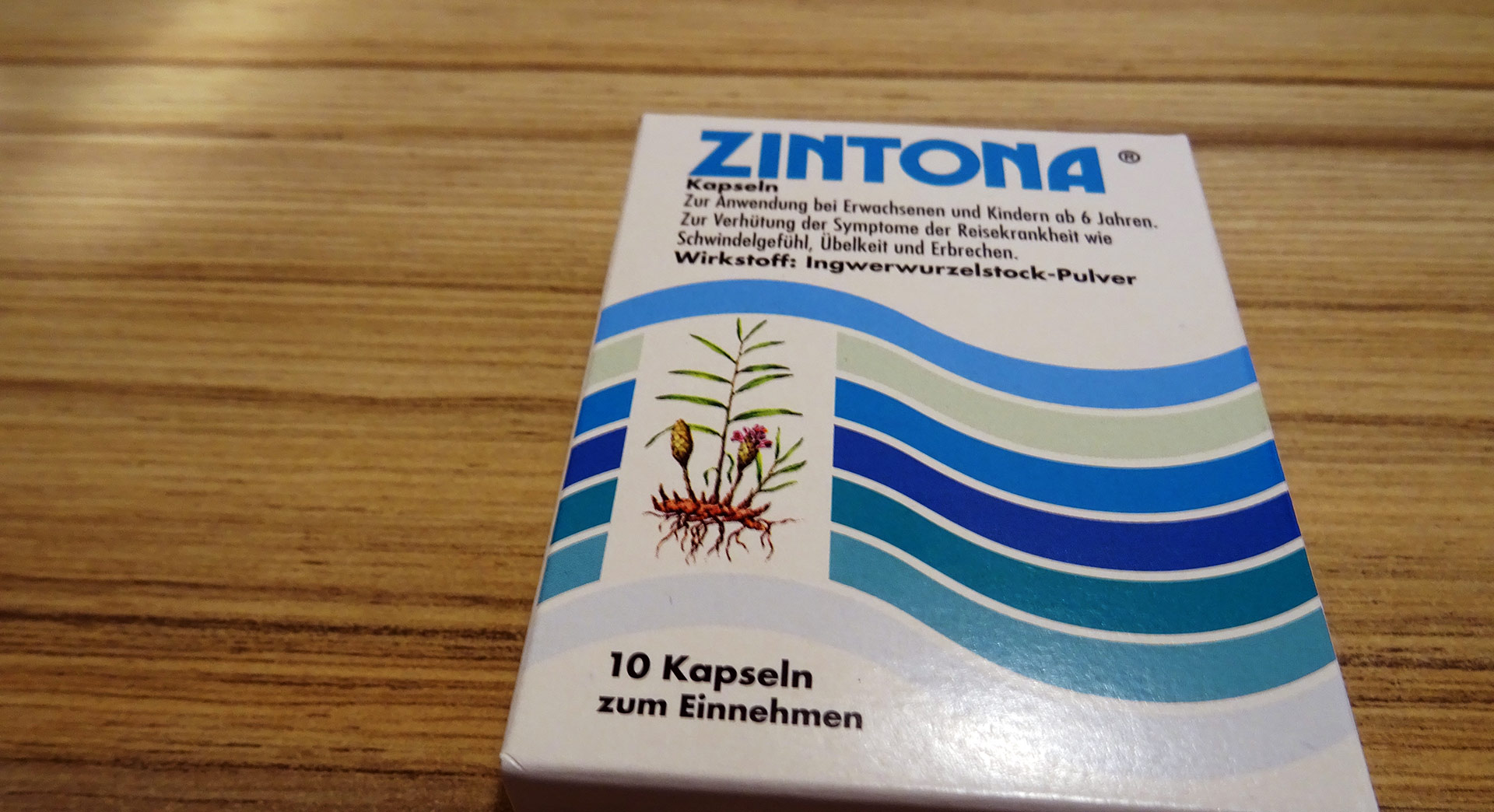
In any case, you should try the herbal alternative because that´s somehow healthier than bombarding your body with chemicals. You can add a Ginger-rich diet well in advance of a sailing trip to your plan of meals, have fresh Ginger tea aboard. Refrain from alcohol (also for safety concerns) and stay away from fatty meat and fat in the diet in general. High doses of Vitamin C and B can also be added in form of vegetables, nuts and spinach as overdosing won´t cause no harm at all. And in case nothing helps: It´s good to have your onboard drugstore prepped with some of the medicine shown above. “Stay away from the hardcore stuff containing Scopolamine or MCP!”, Zeynep advises: “These are very, very powerful drugs with a lot of very unwanted side effects which will practically render any sailor incapable of taking on responsibility for the boat.”

How to behave aboard when seasick?
When sea-sickness strikes, there´s pretty much nothing left to do for the one who suffers than to wait it out. The body has to get along with the motions of the ship and this will take some days to accomplish. When I suffered from nausea during the trip, it took my body two full days to recover. The nice thing about it: Afterwards I was free from any symptoms whatsoever. Remain in a horizontal position whenever you can (in your bunk) as symptoms will ease instantly. Try to sleep. Don´t add stuff to your stomach that doesn´t belong there. Supplement tea with sweet sugar, don´t eat full meals. It can be a good idea to appear in the cockpit to take the helm – at least for one or two hours. Focus on the horizon, steer the boat. It will help to get accustomed to the motion of the boat, the body (the brain) will get used to the motions quicker and besides, helming will acquire most of your attention thus abstracting you, your conscious mind and the stomach at last from the symptoms of sea sickness. As I said, after two days my nausea was gone completely, the longest suffering within our fleet was full four days. Remember that when it´s over, it is over indeed.

“Funny” fact here: It can (and will happen) that you get “Land-Sick” after days on the boat. As we were roaming to the showers in our first port on Porto Santo to take a long, long, loooong hot shower the Skipper warned us: “Don´t close your eyes whilst washing your bodies – you might fall down.” And in fact, one of us was plunging really hard down on the floor tiles. In any way, I hope this article will help you, dear reader, to cope with – hopefully not too severe – symptoms of sea sickness.
Other interesting articles on that topic:
Sailing from Lisbon to Madeira: Being seasick
What makes a good Skipper?
First time offshore



